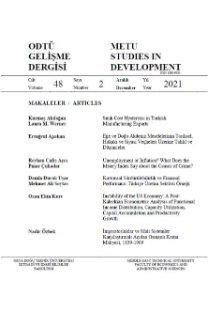Democracy in uncertain times: Inequality and democratic development in the global North and global South
Belirsizlik çağında demokrasi: Küreselleşme, gelir adaletsizliği ve küresel güneyde demokrasinin geleceği
___
- ACEMOGLU, D. and ROBINSON, J. (2013), The Origins of Power, Prosperity and Poverty. Why Nations Fail, Orlando FL: Crown Prince Publishing.
- AGH, A. (2013), "The Triple Crisis in Hungary: The 'Backsliding of Hungarian Democracy after Twenty Years", Romanian Journal of Political Science, 13(1), 25-51.
- BAKER, A. (2010), "Restraining Regulatory Capture? Anglo-America, Crisis Politics and Trajectories of Change in Global Financial Governance", International Affairs, 86 (3), 647- 663.
- BURGES, S.W (2013).,"Brazil as a Bridge between Old and New Powers?", International Affairs, Special Issue: Negotiating the Rise of New Powers, 89(3), 577-594.
- CHAMPEAU, S., CLOSA, C., INNERARITY, D., and MADURO, M. P. (eds.) (2015), The Future of Europe: Democracy, Legitimacy and Justice after the Euro Crisis, London and New York: Rowman and Littlefield.
- CHEN, D. and KINZELBACH, K. (2015), "Democracy Promotion and China: Blocker or Bystander?", Democratization, 22(3), 400-418.
- BAN, C. (2012), "Brazil's New Developmentalism: New Paradigm or Edited Orthodoxy?", Review of International Political Economy, 20(2), 1-34.
- ÇELİK-WILTSE, E. (2013), "Küresel Ekonomik Kriz Sonrası Yeni Dünya Düzeni: 2008 Krizi, Brezilya ve Yeni Sosyal Demokrat Kalkınmacı Model Tartışmaları", Fikret Şenses, Ziya Öniş ve Caner Bakır, der., Ülke Deneyimleri Işığında Küresel Kriz ve Yeni Ekonomik Düzen, İstanbul: İletişim Yayınları, içinde, ss. 311-333.
- DIAMOND, L. (2015), "Facing Up to the Democratic Recession", Journal of Democracy, 26(1), 141- 155.
- DORLACH, T. (2015), "The Prospects of Egalitarian Capitalism in the Global South: Turkish Social Neoliberalism in Comparative Perspective", Economy and Society, 44(4), 519-544.
- ESPING-ANDERSEN, G. (1990), The Three Worlds of Welfare Capitalism, Cambridge UK: The Polity Press.
- JONGRYN, M. (2015), MIKTA, Middle Powers and the New Dynamics of Global Governance, New York: Palgrave and Macmillan.
- INNES, A. (2015), "Hungary's Illiberal Democracy", Current History, 114(770), 95-100.
- KUPCHAN, C. (2012), No One's World: The West, the Rising Rest, and the Coming Global Turn ,Oxford and New York: Oxford University Press.
- LEBOW, N. and REICH, S. (2014), Goodbye Hegemony Power and Influence in the Global System, Princeton NJ.: Princeton University Press.
- LUSTIG, N., LOPEZ-CALVA, L. F., and ORTIZ-JUAREZ, E. (2013), "Declining Inequality in Latin America in the 2000s: The Cases of Argentina, Brazil, and Mexico", World Development, 44(C), 129-141.
- MAIR, P. (2013), Ruling the Void: The Hallowing Out of Western Democracy, London and New York: Verso.
- MCNALLY, C. A. (2012), "Sino-Capitalism: China's Reemergence and the International Political Economy", World Politics, 64(4), 741-776.
- NATHAN, A. (2015), "China's Challenge", Journal of Democracy, 26(1), 156-170.
- NÖLKE, A. (2010), "A "BRIC"-variety of capitalism and social inequality: The case of Brazil", Revista de Estudos e Pesquisas sobre as Americas, 4(1), 1-14.
- ÖNİŞ, Z. (2012), "The Triumph of Conservative Globalism: The Political Economy of the AKP Era", Turkish Studies, 13(2), 135-152.
- ÖNİŞ, Z (2014), "Küreselleşme, Gelir Adaletsizliği ve Demokrasinin Geleceği: Kriz Sonrası Eğilimler", İktisat ve Toplum, 47: 13-25.
- ÖNİŞ, Z. (2015), "Monopolising the Centre: The AKP and the Uncertain Path of Turkish Democracy", The International Spectator, 50(2), 22-41.
- ÖNİŞ, Z. and GÜVEN, A.B. (2011), "The Global Economic Crisis and the Future of Neoliberal Globalization: Rupture Versus Continuity", Global Governance, 17(4), 469-488.
- PEREIRA, A. (2015), "Bolsa Família and democracy in Brazil", Third World Quarterly, 36(9), 1682- 1699.
- PIKETTY, T. (2014), Capital in the Twenty-First Century, Cambridge Mass.: Harvard University Press.
- PLATTNER, M. (2015), "Is Democracy in Decline?", Journal of Democracy, 26(1), 5-10.
- PONTUSSON, J. (2005), Inequality and Prosperity: Social Europe Vs. Liberal America, Ithaca: Cornell University Press.
- RODRIK, D. (2011), The Globalization Paradox: Democracy and the Future of the World Economy, New York: W. W. Norton and Company.
- RISSE, T. and BABAYAN; N. (2015), "Democracy Promotion and the Challenges of Illiberal Regional Powers: Introduction to the Special Issue", Democratization, Online Version, Available at http://dx.do.org/10.1080/13510347.2014.997716.
- SAAD-FILHO, A. (2013), "Mass Protests under 'Left Neoliberalism': Brazil, June-July 2013", Critical Sociology, 39(5), 657-669.
- SANDBROOK, R. (2014), Reinventing the Left in the Global South: The Politics of the Possible, New York: Cambridge University Press.
- STIGLITZ, J.E. (2013), The Price of Inequality: How Today's Divided Society Endangers Our Future, New York: W.W. Norton and Company.
- STREECK, W. (2014a), Buying Time: The Delayed Crisis of Democratic Capitalism, London and New York: Verso.
- STREECK, W. (2014b), "How will Capitalism End?", New Left Review, 87: 35-64.
- ŞENSES, Z., ÖNİŞ, Z., and BAKIR, C., eds., (2013), Ülke Deneyimleri Işığında Küresel Kriz ve Yeni Ekonomik Düzen, Istanbul: İletişim.
- UNITED NATIONS (2014), Human Development Report, 2014, New York: United Nations Development Program available at http://hdr.undp.org.
- VON MERING, S. and MCCARTHY, T.W. (2013), Right-Wing Radicalism Today: Perspectives from Europe and the US, London: Routledge.
- WADE, R. (2013), "How High Inequality Plus Neoliberal Governance Weakens Democracy", Challenge, 56(6), 5-37.
- WEYLAND, K. (2009), "The Rise of Latin America's Two Lefts? Insights from Rentier State Theory", Comparative Politics, 41(2), 145-164.
- ISSN: 1010-9935
- Yayın Aralığı: 3
- Başlangıç: 2018
- Yayıncı: ODTÜ İİBF
The world into the 21st century: Globalization, market capitalism and sustainability
Osmanlı devleti ve Avrupa devletlerinde tağşişler ve nedenleri
KAMİL KIVANÇ KARAMAN, Şevket PAMUK
Hane içine gizlenen kadın yoksulluğu: Muğla-Mardin örneği
Çisel Ekiz GÖKMEN, UMMUHAN GÖKOVALI
Dynamic analysis of employment and domestic value added generated by foreign demand in Turkey
Sevinç MIHÇI, Arzu Akkoyunlu WİGLEY, BAŞAK DALGIÇ
Çağdaş tarım sorunu ve yeni köylülük
The role of the state in escaping the middle-income trap: the case for smart industrial policy
2002 Sonrası Türkiye ekonomisinin performansı: Karşılaştırmalı bir analiz
Ahmet BENLİALPER, HASAN CÖMERT, Güney DÜZÇAY
The effect of the global financial crisis on household income, inequality and poverty in Turkey
Sırma Demir ŞEKER, MELTEM DAYIOĞLU TAYFUR
Do regional trade agreements actually increase Turkey's foreign trade?
